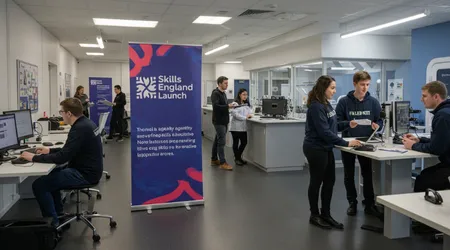Skills England Launch: What the New Agency Means for Apprentices and Colleges

The Skills England launch marks a pivotal moment for the UK’s education and workforce landscape.
Announced in June 2025, this new agency aims to transform how apprenticeships and vocational training are delivered, addressing long-standing skills gaps and aligning education with economic demands.
With industries evolving rapidly think AI, green energy, and digital infrastructure the UK faces a pressing need to equip its workforce with relevant skills.
The Skills England launch isn’t just a policy shift; it’s a bold promise to empower young people, colleges, and employers.
Why should we care? Because this initiative could redefine opportunity for thousands, bridging the gap between education and employment in a world where adaptability is king.
This article dives deep into what the Skills England launch means for apprentices and colleges. From funding boosts to curriculum reforms, we’ll explore its implications with fresh insights and real-world examples.
Expect a clear, engaging breakdown of how this agency will shape the future, backed by data and grounded in 2025’s reality. Let’s unpack this transformative moment.
The Vision Behind Skills England
The Skills England launch responds to a critical challenge: aligning education with the UK’s economic ambitions. The agency, established under the Department for Education, seeks to streamline skills training by coordinating with employers, colleges, and local authorities.
Its mission? Ensure training reflects real-world needs, from cybersecurity to renewable energy.
A letter from Education Secretary Bridget Phillipson in June 2025 outlined priorities like boosting apprenticeship starts and enhancing college facilities. This clarity sets Skills England apart from past fragmented efforts.
++ Third Consecutive Heatwave Hits UK Amid Water Crisis and Drough
Consider Jamie, a 19-year-old from Leeds, eyeing a career in green tech. Previously, finding a relevant apprenticeship felt like navigating a maze.
With the Skills England launch, Jamie now accesses clear pathways, with colleges offering tailored courses in solar panel installation, backed by industry input. This isn’t just about jobs it’s about building careers that drive the UK’s net-zero goals.
The agency also tackles a structural issue: the disconnect between education providers and employers.
By fostering partnerships, Skills England ensures colleges teach what industries need. This vision promises a future where training isn’t a gamble but a strategic step toward prosperity.

Apprenticeships: A New Era of Opportunity
The Skills England launch prioritizes apprenticeships, especially for under-22s, as a cornerstone of its strategy. In 2022, apprenticeship enrollments hit 46,800, a sharp rise from 1,000 in 2015, showing growing demand.
Yet, vacancies for entry-level roles have dropped 32% since 2022, partly due to AI automation. Skills England aims to reverse this by funding 120,000 new apprenticeship places, focusing on sectors like healthcare and construction.
Take Sarah, a 20-year-old from Birmingham, training as a nursing apprentice. Thanks to the Skills England launch, her program now includes telehealth modules, reflecting 2025’s healthcare trends.
Also read: OfS Tightens Free Speech Rules: What Universities Must Do by August
This targeted approach ensures she’s job-ready, not just qualified. The agency’s focus on under-22s also addresses youth unemployment, with one in seven young people not in education or employment.
Moreover, Skills England introduces flexibility with short and foundation apprenticeships. These cater to industries needing quick, specialized training, like digital marketing, where enrollments surged 40% in 2024.
For apprentices, this means faster entry into high-demand fields, with less debt than traditional degrees.
Colleges: From Classrooms to Career Hubs
Colleges are at the heart of the Skills England launch, transforming into dynamic hubs for skills development.
The agency’s £275 million investment, announced in June 2025, funds technical excellence colleges and cutting-edge facilities.
This cash injection supports courses in AI, digital manufacturing, and renewable energy, aligning with industry needs.
Coventry College, for instance, showcased its upgraded labs during a Skills England visit, highlighting its role in training for local tech firms.
Picture a college as a bridge, not a destination. Skills England empowers institutions to connect students directly to jobs, with curricula shaped by employer feedback.
Read more: UK Expands Lifelong Loan Entitlement: What It Means for Adult Learners
This shift tackles the criticism that colleges often lag behind industry trends, ensuring students like Aisha, studying cybersecurity, graduate with skills that match 2025’s digital economy demands.
The Skills England launch also addresses tutor shortages, particularly in engineering and construction, where colleges struggle to compete with industry salaries.
By supporting recruitment and training, the agency ensures colleges can deliver high-quality programs, making them vital cogs in the skills ecosystem.
| Sector | New Apprenticeship Places (2025-2026) | Key Skills Focus |
|---|---|---|
| Healthcare | 40,000 | Telehealth, mental health support |
| Construction | 30,000 | Sustainable building, engineering |
| Technology | 25,000 | AI, cybersecurity, digital marketing |
| Green Energy | 15,000 | Renewable energy, grid technologies |
| Hospitality | 10,000 | Customer service, management |
Economic and Social Impact
The Skills England launch isn’t just about education it’s a catalyst for economic growth and social mobility.
By targeting high-growth sectors like green energy, the agency supports the UK’s Clean Power 2030 goals.
Industry leaders, like Claire Bottle of the UK Warehousing Association, emphasize the need for a national skills strategy to meet decarbonization targets. This alignment ensures workers are ready for jobs in solar, wind, and grid technologies.
Socially, the initiative breaks barriers for young people. With 59% of 13-17-year-olds considering apprenticeships in 2023, Skills England taps into this enthusiasm, offering pathways for those who might bypass university.
For communities in the “red wall” regions, where industrial decline hit hard, this is a lifeline to opportunity.
Think of Skills England as a gardener, planting seeds for long-term prosperity. By nurturing talent in underserved areas, it fosters inclusive growth, ensuring no one is left behind in the race to a skilled future.
Challenges and Criticisms

No initiative is flawless, and the Skills England launch faces hurdles. Critics argue the £275 million investment, spread over four years, is modest compared to the skills gap’s scale.
Industries like construction still face tutor shortages, limiting apprenticeship growth. Rachel Anderson from the North East Chamber of Commerce notes that funding alone isn’t enough without systemic fixes.
There’s also the risk of uneven rollout. Rural colleges may struggle to access the same resources as urban hubs, potentially widening regional disparities. Ensuring equity in delivery will be critical to avoid leaving smaller communities behind.
Skeptics question whether Skills England can deliver on its ambitious promises quickly enough.
With visa rules tightening for skilled workers from July 2025, the pressure is on to train domestic talent fast. Overcoming these challenges will test the agency’s agility and resolve.
A Call to Action for Stakeholders
The Skills England launch demands collaboration. Employers must engage with colleges to shape curricula, ensuring training meets real-world needs.
Colleges should seize funding to modernize facilities and recruit top educators. Students, meanwhile, can explore apprenticeships with confidence, knowing they’re backed by a system designed for their success.
For policymakers, the focus must be on sustained investment and equitable access. Ignoring schools in funding uplifts, as Kate Ambrosi notes, risks undermining the pipeline to apprenticeships.
Stakeholders must act now to turn vision into reality, ensuring Skills England’s impact is felt nationwide.
Imagine a future where every young person, from Bristol to Burnley, has a clear path to a thriving career. That’s the promise of Skills England but it needs collective effort to succeed.
Conclusion: A Skills Revolution Awaits
The Skills England launch is more than a policy it’s a bold step toward a future where education fuels opportunity and growth.
By empowering apprentices and transforming colleges, it addresses the UK’s skills crisis head-on. From Jamie’s green tech aspirations to Sarah’s nursing training, real people stand to benefit.
Yet, success hinges on overcoming funding limits, tutor shortages, and regional gaps. With collaboration, this initiative could redefine the UK’s workforce, making it a global leader in skills.
What will your role be in this skills revolution? The Skills England launch invites us all students, educators, employers to shape a brighter, more inclusive future. Let’s make it happen.
Frequently Asked Questions
What is the Skills England launch?
The Skills England launch refers to the 2025 establishment of a new agency to align UK skills training with economic needs, focusing on apprenticeships and colleges.
How will Skills England benefit apprentices?
It funds 120,000 new apprenticeship places, prioritizes under-22s, and introduces flexible training like short apprenticeships, enhancing job prospects in high-demand sectors.
What changes can colleges expect?
Colleges gain £275 million for modern facilities and courses in AI, green energy, and more, becoming career hubs with industry-aligned curricula.
Are there any criticisms of Skills England?
Yes, some argue the funding is insufficient, and rural colleges may face resource disparities. Tutor shortages in key sectors also pose challenges.
How can I get involved with Skills England programs?
Students can explore apprenticeships via gov.uk, colleges can apply for funding, and employers can partner with Skills England to shape training programs.
